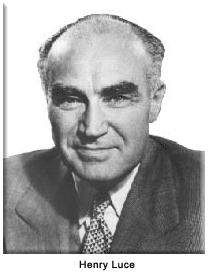 Born in China on April 3, 1898, Henry R. Luce was educated at the Chefoo School, a British boarding school in northern China, and at Hotchkiss School in Lakeville, Connecticut. In 1916, he enrolled at Yale, where he edited the Yale Daily News. In 1918, he served briefly with the Yale Student Army Training Corps at Camp Jackson, South Carolina, where he earned a commission as second lieutenant.
Born in China on April 3, 1898, Henry R. Luce was educated at the Chefoo School, a British boarding school in northern China, and at Hotchkiss School in Lakeville, Connecticut. In 1916, he enrolled at Yale, where he edited the Yale Daily News. In 1918, he served briefly with the Yale Student Army Training Corps at Camp Jackson, South Carolina, where he earned a commission as second lieutenant.
Henry Luce graduated from Yale University in 1920, studied at Oxford, and became a reporter for the Chicago Daily News. In 1923, Luce founded Time magazine with Briton Hadden as business manager, but after the latter's sudden death in 1929, Luce took over his position. Making a success of his first magazine, he went on found Fortune in 1930, Life in 1936, and Sports Illustrated in 1954. In addition to the titles he started, Luce acquired Architectural Forum and House and Home. All of these were ventures of Time, Inc. Luce served as chairman of Time, Inc. and as editor in chief of each of the magazines. Believing in Republicanism, anticommunism, and internationalism, he pressed his beliefs on the magazines' writing staffs and compelled them to express his personal views in their articles. At one point, he ran five cover stories on Benito Mussolini, to promote Fascism. Later, he used his magazines to advocate for Wendell Willkie and Dwight D. Eisenhower, among others. Time and Life became the "gold standard" of weekly magazines. The New Yorker, possibly out of jealousy, once ran a cartoon showing one editor of Life asking another, "Is it OK to call our subscribers readers?" Life has ceased publication, but the other three that Luce founded are still going strong. Henry R. Luce was perhaps the most influential magazine publisher in the United States since S.S. McClure. He died in Phoenix, Arizona, on February 28, 1967.